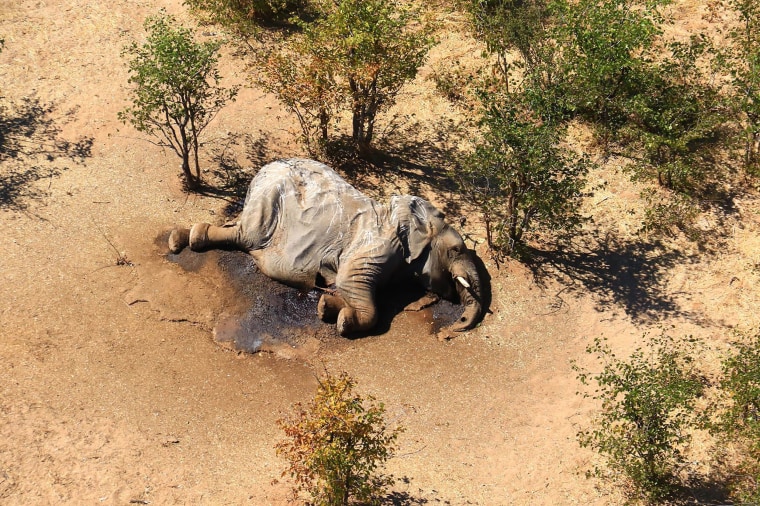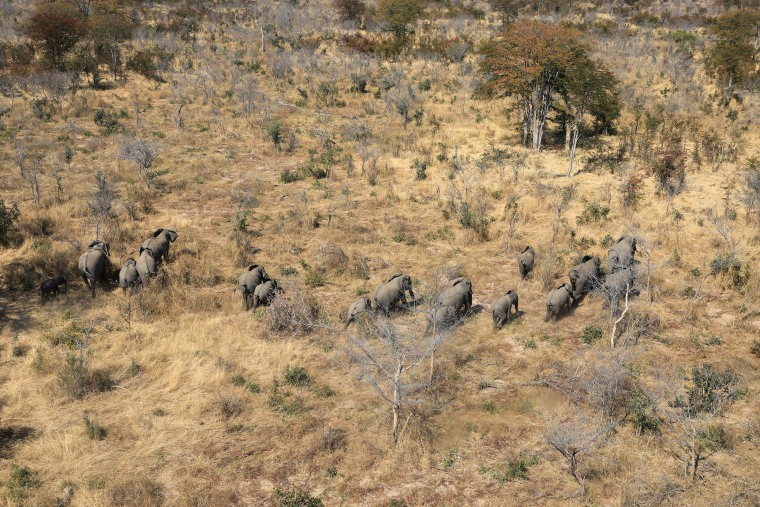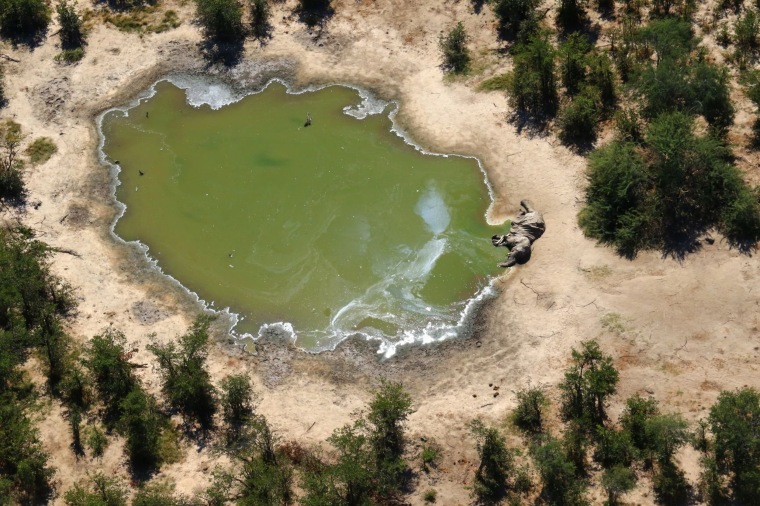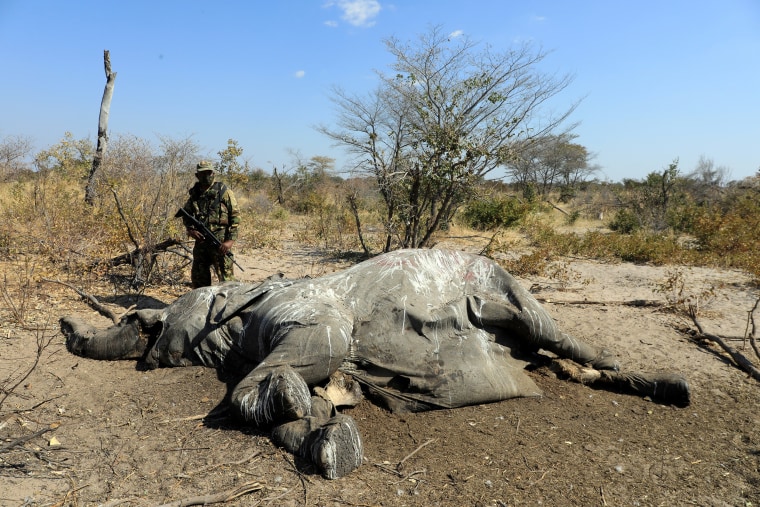Botswana's elephants are literally dropping dead.
Hundreds of elephant carcasses have been found scattered across a remote, narrow region of the north — and poaching isn't to blame.
The mystery has dragged on for months, and experts say the slow response to the deaths has shed light on deeper issues in the country's relationship with the prized creatures.
The carcasses of at least 67 adult elephants were found in May, the acting permanent secretary of Botswana's Environment Ministry, Oduetse Koboto, said at a news conference Friday. Aerial surveys of the Okavango Delta, a wetland near the Namibian border, have confirmed 281 deaths, although as many as 356 carcasses have been reported.
While not heavily populated, the area is "overstuffed" with elephants, Pieter Kat, director of the U.K.-based conservation group LionAid, said in an interview. That's because — compared to neighboring Zimbabwe, Angola and Namibia — Botswana has long prohibited hunting and has been a leader in anti-poaching efforts.
"Wherever these elephants went when they stepped out of Botswana, they were either poached or killed or they were shot by hunters, so no wonder they concentrated back into northern Botswana," Kat said.
An estimated 130,000 elephants live in Botswana, about 18,000 of which forage in the immediate area where the carcasses were found.
"This is not a very significant mortality," Cyril Taolo, acting director of the Department of Wildlife and National Parks, said at Friday's news conference.
But conservationists say otherwise. Africa's elephant population has diminished to about 415,000 from 3 million to 5 million a century ago, according to the World Wildlife Fund.
A few hundred elephants may be a relatively small percentage of the population. Given the vulnerability of the species, however, the unknown threat is disconcerting, said Keith Lindsay, a conservation biologist based in Oxford, England, who specializes in elephants.

"It's worrying," Lindsay said. "If it is a disease, then it could be catastrophic."
Anthrax, a disease caused by a naturally occurring bacterium in the environment, can cause high rates of mortality among elephants and other species, Lindsay said.
But tests have ruled anthrax out, said Botswana's principal veterinarian, Mmadi Reuben.
Many things can kill elephants — from poaching to environmental factors and simply old age.
Poaching was also ruled out quickly because the elephants' tusks — the main draw of the illegal ivory trade — were intact, Lindsay said. The country wasn't in the dry season when the first deaths were reported, and it hasn't been suffering from a drought, meaning there should be enough vegetation to sustain the animals.
Many of the adult elephants that have died were still in their prime years — too young to be dying of natural causes.
"The way that they were seen from the air sort of dragging their hind legs and walking around all suggests some sort of agent that interfered with our normal nerve communications," Kat said.
Lindsay said that while another disease is always a possibility, the scale and speed at which the elephants are dying makes a disease unlikely.
"The only thing that kills elephants quickly is people killing elephants," he said.
But if not for ivory, then for what? Possible reasons are far from clear.
Conflict between people and wildlife, which can include the destruction of property, agriculture and even human deaths, is another reason elephants can be targeted, Kat said.
With the elephant population running high, Botswana reintroduced trophy hunting last year. The first round of 70 licenses, with a quota of killing a total of 272 elephants, were made available this year, but the practice has been on hold because of coronavirus lockdowns.

"The elephant quotas were set in particular places where there was elephant conflict," Kat said. "I can very easily see that people would say, right, we were promised all this stuff, so now we're going to take matters into our own hands."
But government officials dismissed any connection.
"It is not clear why anyone would want to link the elephant mortalities to hunting," Taolo, of Botswana's Department of Wildlife and National Parks, said in a statement.
Reintroducing hunting is actually among a variety of measures that have given communities incentive to protect wildlife resources, he said.
Hunting quotas haven't been changed as a result of the deaths, either, but Taolo said the government is monitoring the situation closely.
Still, there are various ways elephants can be targeted for poisoning, Kat said. Because of the height of the animals, poisoned fruit could be hidden in trees they could reach — which would also explain why only mature elephants appear to be falling ill.
Kat isn't blaming the community, however. He said better transboundary conservation measures would help spread out the population more.
There are agreements to preserve migration routes for wildlife between Botswana and its neighbors — specifically the Kavango Zambezi Transfrontier Conservation Area, which was established in 2006.
Just last year, the member countries signed on to a plan to combat poaching in the region, said Nyambe Nyambe, executive director of the conservation area in Botswana.
The plan has also helped preserve migration corridors that allow elephants and other species to roam the continent, he said. "You cannot reverse that once you lose the habitat," he said.
Download the NBC News app for breaking news and alerts
Still, there are competing interests.
"People need to plow their fields," Nyambe said. Any conservation plans need to be "cognizant of the livelihoods of the people and the economic opportunities that need to be developed. And there will be trade-offs."

There is plenty of economic incentive to protect the land.
Tourism is one of the biggest sectors in the country, after mining, accounting for more than 12 percent of the country's gross domestic product and providing just over 10 percent of employment, according to the World Travel and Tourism Council. And elephants, along with other wildlife unique to the continent that can be seen on safaris, are the main attraction.
Some answers are due soon. Results from testing completed at a laboratory in Zimbabwe have been delivered, said Koboto, of the Environment Ministry. But the findings won't be revealed until results from additional tests underway in South Africa, Canada and the United States are returned for comparison.
Testing has been slowed because of restrictions on movement related to the coronavirus pandemic. And the comparisons are necessary to ensure that the findings are conclusive, Koboto said.
But experts are skeptical of the delays.
"The cause of death should have been a piece of cake to decipher, especially since fresh carcasses were available and samples were collected," Kat, of LionAid, wrote in an op-ed in the Journal of African Elephants. "This cannot be shuffled conveniently under a carpet woven of complacency and excuses."
Even the delay between initial reports that dozens of elephants had died in early May and the government's confirmation of the numbers is worrying, said Lindsay, the conservation biologist.
"They don't seem to be totally in control of the situation," he said.
However, Botswana authorities maintain that they are meticulously investigating.
"The fact that we are prepared to send samples to other laboratories should be evidence enough that we are transparent and have nothing to hide," Taolo said. "The fact that Botswana has the world's largest elephant population is testimony to our commitment to conservation of the species."

